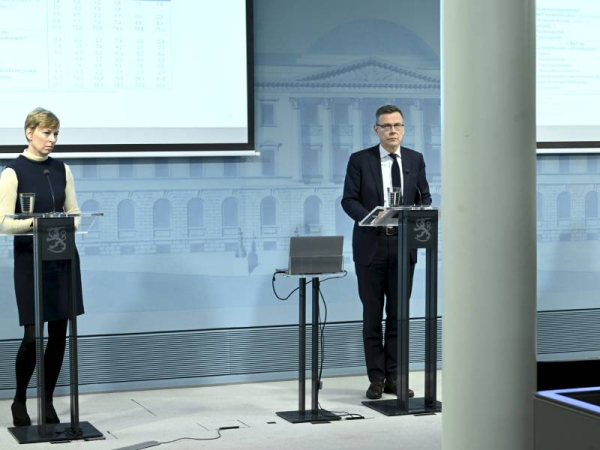
Jenni Pääkkönen (left) and Mikko Spolander (right) of the Ministry of Finance reacted at the launch event of the ministry’s new economic forecast in Helsinki on Monday, 9 October 2023. The Finnish economy, the forecast indicates, will remain in recession for the rest of the year but resume growth next year as exports, investments and private consumption recover. (Heikki Saukkomaa – Lehtikuva)
- Next Article The cash dilemma: Why 95% of Finns cling to cash in a digital age
THE FINNISH ECONOMY will remain in recession for the rest of the year but resume growth next year, forecasts the Ministry of Finance.
The Ministry of Finance on Monday released its latest economic forecast, estimating that the economy will fail to grow this year as a result of the recession it will slip into in the latter parts of the year. The recession will be mild and short, however.
“We aren’t assuming any particular structural frictions or plugs that’d prolong the recession. We view this as a phase that’s related to normal economic cycles,” Mikko Spolander, the director general of the Ministry of Finance, stated at a press conference in Helsinki on Monday.
Exports, investments and private consumption are all forecast to resume growth next year, driving up the gross domestic product by 1.2 per cent. The growth forecast for the following year is 1.8 per cent.
“We’re expecting the economy to see growth in the ballpark of one-and-a-half per cent also according to our long-term forecast,” said Janne Huovari, a financial advisor at the Ministry of Finance.
The Ministry of Finance is therefore more bullish about the national economy than the Bank of Finland. The central bank reported last month that it expects the gross domestic product to grow by no more than 0.2 per cent in 2024.
“We have a slightly more optimistic view than many others, but the difference isn’t particularly pronounced. Everyone shares an understanding that growth will be weak this year and that it’ll be clearly better next year. You have to also keep in mind that there are some uncertainties in the air,” remarked Huovari.
The risks in the forecast are related to the woes of the construction industry, consumption habits of households, development of the global economy and economic struggles of China and Germany.
Huovari also drew attention to the armed hostilities that broke out last weekend in Israel, saying they are “another indication of what can happen” globally. While the war will not have a major short-term impact on the Finnish economy, he added, such impacts could arise if it spread more broadly in the Middle East.
“The global economy’s dependence on oil has decreased significantly from what it used to be,” he also reminded.
The Ministry of Finance expects Finnish households to loosen their purse strings in the coming years as inflation slows, interest rates drop and wage increases outpace price increases. The rise in consumer prices is forecast to slow to slightly over two per cent in 2024 and to slightly under two per cent in 2025.
The outlook for investments is positive despite the rapid slowdown in residential construction, according to the ministry.
It also expects the decline in employment to be temporary: the employment rate for 15–64-year-olds is forecast to increase to 74.3 per cent and the unemployment rate to decrease to 7.0 per cent by 2025.
In spite of the positive signs, the public economy will deteriorate in the coming years and the debt ratio will continue to climb, almost reaching 82 per cent in 2027. The combined deficit of the central government, municipal sector and well-being services counties will remain over 14 billion euros in 2027.
Jenni Pääkkönen, a financial advisor at the Ministry of Finance, said the forecast takes into account measures forwarded in the government programme that were confirmed in the budget session and outlined in the general government fiscal plan.
“In practice, the dwindling of revenues will cancel the effect of savings,” she summed up.
“Well-being services counties are operating on significant deficits, and we’ve taken that into consideration in the forecast. While the counties have announced they’re taking various measures [to narrow the deficits], we can’t take them into consideration until we have information on them.”
Spolander stated that the situation would not be “quite as bleak” if all the measures forwarded in the government programme were implemented as quickly as possible. “The deficit would still be about 10 billion euros in 2027,” he told.
The Finnish government is seeking to narrow the deficit in the public economy to one per cent of gross domestic product by 2027. Officials at the Ministry of Finance have estimated that it would have to carry out one billion euros worth of additional cost savings in order to reach the target.
Aleksi Teivainen – HT
- Next Article The cash dilemma: Why 95% of Finns cling to cash in a digital age
Source: www.helsinkitimes.fi
